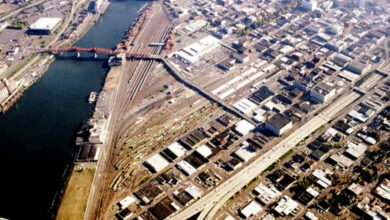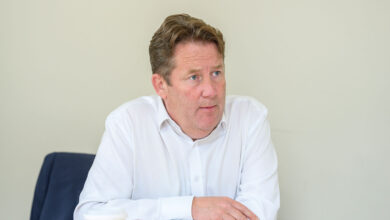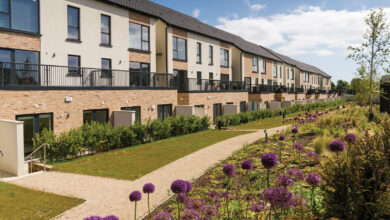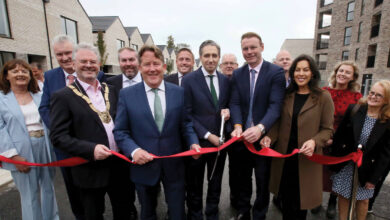A closer look at Sinn Féin’s alternative housing plan

In September 2024, Sinn Féin published its alternative housing plan, A Home of your Own: Sinn Féin’s Plan to make Housing Affordable, in which it pledges that a Sinn Féin government would deliver 300,000 homes in five years.
Housing is – self-evidently – Sinn Féin’s single most potent policy platform. Speaking at the launch of her party’s plan, Sinn Féin president Mary Lou McDonald TD insisted that it “has the answers for the rental sector, for public housing, and also for the private market”. “We are making a very, very big commitment to people that for a Sinn Féin government this is the number one priority,” she emphasised.
With an emphasis on working people, home ownership, and affordability, the 110-page policy document is a direct challenge to the Government’s Housing for All plan. Across six chapters, the document explores Sinn Féin’s overarching vision and its perspective on housing need; public housing; private purchase housing; adequate housing (including homelessness and sustainability); and housing delivery.
Summary
At a macro level, A Home of Your Own commits a Sinn Féin government to “make housing affordable and to bring homeownership within reach of working people”. This, the party suggests, entails a holistic transformation of housing in Ireland from how housing is understood and planned, to how communities are established, and to how homes are constructed.
Sinn Féin’s figure for annual housing delivery is 60,000, totalling 300,000 homes over five years. During this period, the party’s projected total cost of its public housing programme between €39 billion and €37 billion for a new build programme and €2 billion for an acquisitions programme. Average annual expenditure, it says, would total €7.8 billion.
The total figure, Sinn Féin says, would be provided for via €25.3 billion in voted capital expenditure (requiring annual Dáil approval) from the Exchequer and €13.7 billion in non-voted expenditure (not requiring annual Dáil approval) made up of loans from the Housing Finance Agency and others. Annually, this would average €7.8 billion, of which an average of €5.1 billion would be voted and €2.7 billion would be non-voted.
Forming the basis of these costings are the most recent figures available (adjusted for inflation) from DHLGH and Department of Children, Equality, Disability, Integration and Youth on social, affordable, and modular housing delivery. These figures – determined via a series of parliamentary questions submitted by Eoin Ó Broin and Patricia Ryan TD to the relevant ministers – indicate an average Public Housing Fund contribution of €103,000 per affordable purchase home and an average Public Housing Fund contribution of €155,000 per affordable cost rental home.
Affordability, as defined by A Home of Your Own, “means selling homes to eligible purchasers at prices between €250,000 and €300,000 depending on size and location”. This price range, it says, would be reviewed and adjusted according to several variables including “the movement of wages, construction sector inflation, and interest rates”.
|
Sinn Féin’s major housing commitments
|
Central to its plan for social and affordable housing is a new model for public housing known as affordable leasehold purchase. This plan was covered in some detail in the previous issue of eolas Magazine (65, September 2024).
In a lengthy interview, Ó Broin outlined: “I have conversations with people all around the country about this. The overwhelming majority of people want to buy a home for them, their children, and their grandchildren, at a price they can afford. They are not, in the first instance, buying it and thinking of the windfall gains in 20 years.
“Our scheme allows them to do it; they own the home. The bricks and mortar are theirs, but the land is the State’s, as is the cost of site servicing. Whether you buy an affordable home or you acquire your tenant purchase home, that property is yours and you have all the same rights as any other owner. The only difference is that the State owns the land.”
Vision
In short, Sinn Féin asserts that “everyone should have a home of their own”. Looking beyond the narrowest definition of a housing unit as a metric, the party recognises the contribution of homes to individual, familial, communal, and national wellbeing.
Simultaneously, the party emphasises its commitment to “bringing homeownership back within reach for working people” and indicates a desire of “halting the decline in homeownership”.
Its vision of a “balanced housing system” means a shift away from the current context in which 84 per cent of all housing is ‘private for profit’ and 10 per cent social to one in which non-profit public housing constitutes 30 per cent of the system.
While acknowledging that “the role of government is not to promote one form of tenure over another”, A Home of Your Own insists that “its role should be to ensure that through the delivery of public housing and the regulation and activation of private housing there is a sufficient supply of secure, adequate, and affordable homes to meet society’s needs”.
“The overwhelming majority of people want to buy a home for them, their children, and their grandchildren, at a price they can afford.” Eoin Ó Broin TD, housing spokesperson, Sinn Féin
This means delivering a “sufficient volume” of public homes to meet social and affordable need.
Constitutional right
Sinn Féin also articulates its belief that “having a home of your own is a fundamental human right” and as such should be – pending a referendum – enshrined into Bunreacht na hÉireann. This, it asserts, would have four benefits:
- clarifying the balance of constitutional rights as per property rights and the right to a home;
- placing a legal obligation on government to vindicate the right;
- creating a context of action; and
- providing those excluded from the housing system with access via a legally enforceable right.
Need
On overall housing need, Sinn Féin disputes the 2020 ESRI projection of between 26,000 and 33,000 new homes needed to meet population growth each year. Based on the 2016 census, this figure excluded pent up demand or unmet need. Regardless, in 2024, the Government’s current housing delivery target is almost universally acknowledged to be hopelessly inadequate. As such, an update to Housing for All, as per the first revision of the National Planning Framework had been anticipated to set a new target.
However, the annual update to Housing for All, which had originally been scheduled to be published in October 2024 (ahead of a general election) has been delayed. In late October 2024, a spokesperson for the Department of Housing, Local Government and Heritage told eolas Magazine: “It is being finalised. It will be published in due course.”
Meanwhile, the June 2024 Report of The Housing Commission outlined that an estimated range of unmet need (between 212,500 and 256,000 homes) should be included in the Government’s baseline target.
The following month, in July 2024, the ESRI produced an update to its 2020 housing need assessment which – as per government terms of reference – did not include unmet demand. In the ESRI’s assessment, the structural demand informed by demographic change necessitated an average annual delivery of 44,000 new homes from 2024 to 2030 and 40,000 from 2030 to 2040.
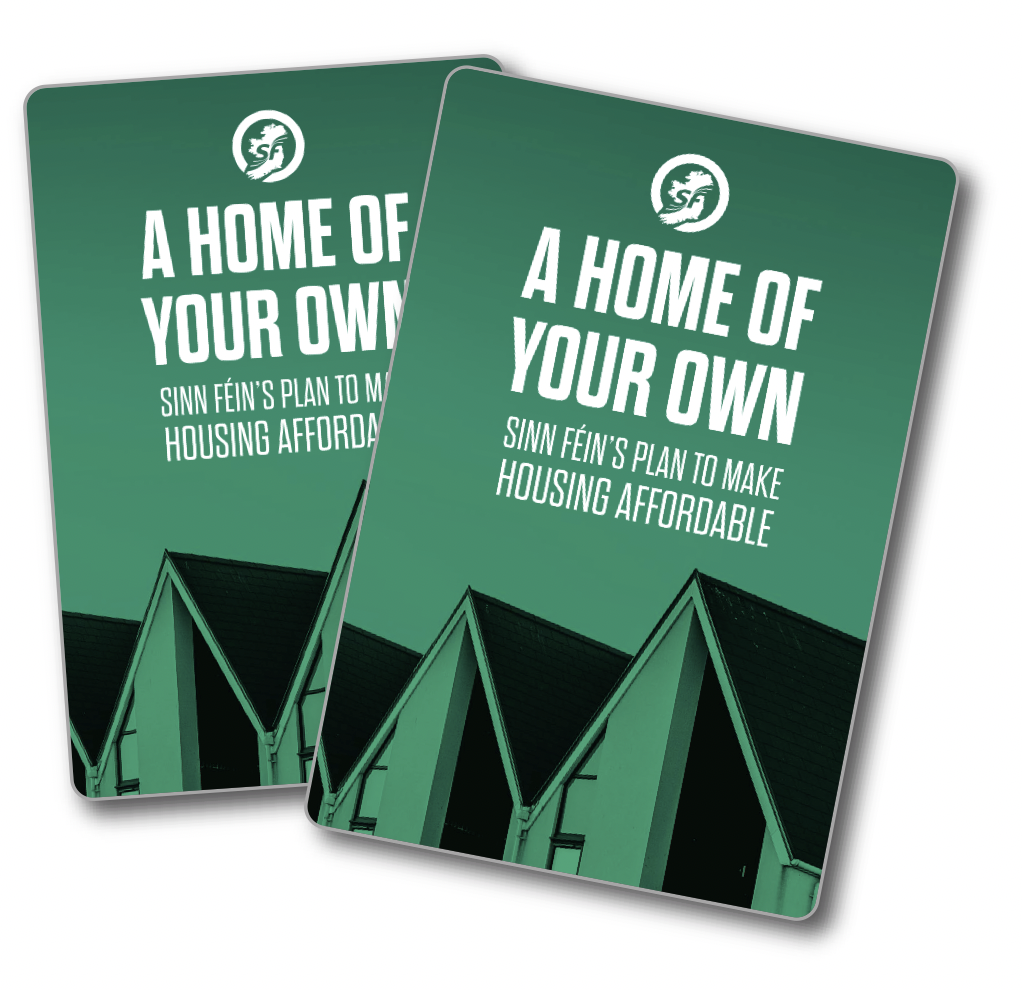
As such, Sinn Féin has “accepted The Housing Commission’s assessment of overall need requiring the delivery of 300,000 homes from 2025 to 2030. Of these, it says, “at least 125,000… must be public homes to meet social and affordable housing need” while the “remaining 175,000 homes would be delivered by the private sector”. One interesting proposal is the establishment of a “Housing Needs Demand Assessment group” comprising the CSO, ESRI, and The Housing Agency to update overall housing need data annually.
Conceding that “government cannot control private sector output in the same way as it can with public sector output”, the opposition party proposes a “rebalancing of private sector output in favour of homes for sale to owner occupiers”. In pursuing this, Sinn Féin indicates that it will “work with the private residential development sector to reduce the size of the private rental sector as a percentage of overall stock with the objective of delivering an annual average of 23,000 owner occupier homes, 7,000 private rental homes and 5,000 self-build homes.”
Homelessness
Criticising the absence of “comprehensive data” on homelessness (including rough sleepers, those living in emergency accommodation, and the hidden homeless), Sinn Féin has pledged to reconvene the National Homelessness Consultative Committee (NHCC) data subgroup which would agree a “methodology to provide an accurate count of all those people experiencing homelessness” and report quarterly alongside DHLGH’s monthly report on those accessing emergency accommodation.
The party has also committed to a departmental five-year action plan “detailing how the objectives of the Lisbon Declaration will be achieved by 2030”, a temporary (six-month initially) emergency ban on no-fault evictions which would be removed “when the numbers in emergency accommodation have fallen significantly”, a doubling of new Housing First tenancies to 500 per annum, and the phasing out of shared emergency accommodation and an end to the use of hotels and B&Bs as emergency accommodation.
Delivery
Sinn Féin supports The Housing Commission’s proposal to establish a Housing Delivery Oversight Executive and, upon entry into government, commits to establishing it “immediately on a non-statutory basis while preparing the necessary legislation”.
On land management, the party suggests that the State requires an “Active Land Management Agency” with a sole focus on the strategic management of public land with ad hoc intervention in the private land market. This body would be equipped with “comprehensive compulsory purchase order powers” and would replace the Land Development Agency (LDA), which the party says, “[has] neither the legal powers nor the singular focus to fulfil its land management function” because, in its assessment, the LDA’s remit had expanded to become a “state-wide residential developer”.
In Sinn Féin’s plan, the LDA’s residential functions and assets would be transferred to an off-balance sheet designated activities company “owned by the local authorities in which the LDA properties are situated”. The rationale is to enable the Active Land Management Agency “to focus solely on land supply and activation without causing any disruption to the current pipeline of developments and contracts currently underway within the LDA”.
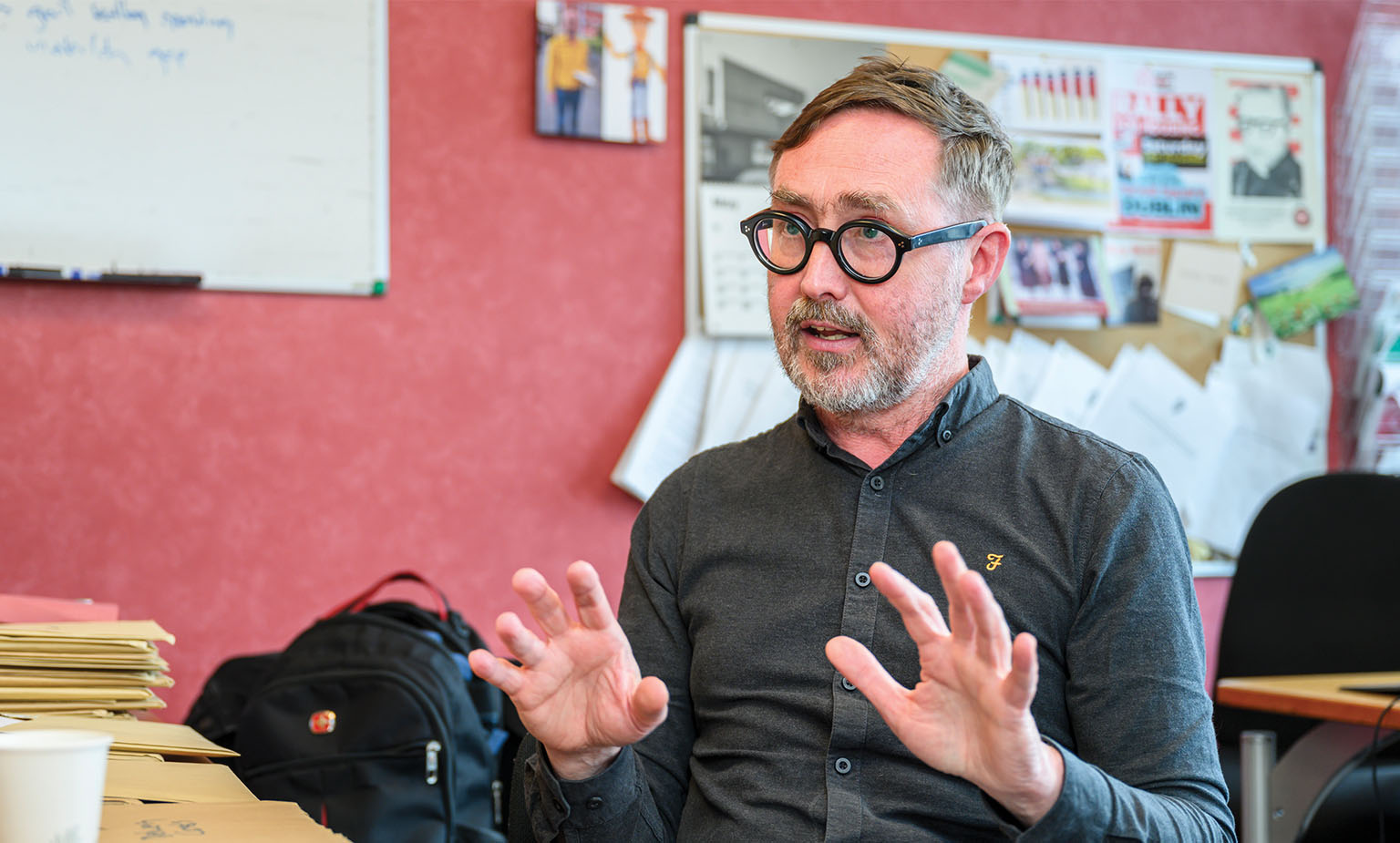
Government response
Responding to the alternative plan, senior government figures have been critical.
Speaking to the media in Dublin the day that Sinn Féin’s policy was published, Taoiseach Simon Harris TD accused the party of making “miserly” proposals which are “just downright mean to first-time buyers”.
“In relation to the opposition party’s proposals, if you can call them that…
I think there is a reason they call the document ‘A Home of Your Own’ rather than ‘A Home You Own’ because it is an almost Frankenstein arrangement here in terms of what exactly is the model,” he said.
“So, are we talking about a situation where you can own a home, but you will not own the land on which the home is built? … We are going to have a house now that you think you own, you will not own the land on which it is built, and when you go to sell the house, do you need Eoin Ó Broin’s permission? Who can I sell it to? How much can I sell it for? When can I sell it? This is a long way from the home ownership model that is engrained in people in this country. And, of course, all of that, Eoin, is if you can get a loan in the first place in relation to your proposition.”
The following day, on X, Housing Minister Darragh O’Brien TD asserted: “Sinn Féin’s housing plan means they will control how you sell your home, who you sell your home to and at what price. Without owning the land it is on, that is not ‘A Home of Your Own’.”
Speaking on RTÉ’s Prime Time that night, he added: “I have looked at the [Sinn Féin] plan… If I was a first-time buyer watching in this evening, I would be very very concerned because all of the supports that have been brought in place by me and by this government… €100,000 of supports which thousands of people are accessing, Sinn Féin would abolish it, in one fell swoop they would abolish it… and what would they replace it with? A stamp duty measure that is worth about €4,500.”
Furthermore, the Minister’s main thrust of critique is based on the assertion that the affordable leasehold purchase proposal at the core of Sinn Féin’s plan raises challenges relating to the mortgageability of associated properties.
However, talking to eolas Magazine ahead of the report’s publication, Ó Broin emphasised: “The interesting thing, of course, is that under the Government’s Help to Buy scheme, you do not own your home because they own €100,000 worth of equity in it.”
Indeed, in recent months he has indicated that through his party’s engagement with the Banking and Payments Federation Ireland (BPFI), mortgage finance options under the affordable leasehold purchase scheme have been outlined by the representative body.
Originally scheduled to be published in September 2024, BPFI’s “detailed proposal” on Sinn Féin’s alternative plan – including any challenges relating to mortgageability that are identified – remains highly anticipated though unlikely to be published this side of a general election, in spite of Minister O’Brien’s interventions.
In the meantime, the forthcoming general election will force the electorate to make a decision on the direction of travel for housing policy in the State. As Ó Broin summarised in a discussion with this publication, the coming weeks and months “are going to be about is a debate about two housing plans – the Government’s and ours – and who has the most credible set of propositions for delivering those plans.”


